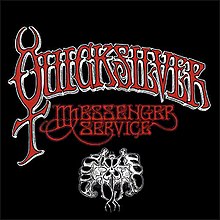Quicksilver Messenger Service (album)
| Quicksilver Messenger Service | ||||
|---|---|---|---|---|
 | ||||
| Studio album by | ||||
| Released | May 1968 | |||
| Recorded | 1968 | |||
| Genre | Psychedelic rock, acid rock | |||
| Length | 31:46 | |||
| Label | Capitol (US) | |||
| Producer | Nick Gravenites, Harvey Brooks, Pete Welding | |||
| Quicksilver Messenger Service chronology | ||||
| ||||
Quicksilver Messenger Service is the debut studio album of Quicksilver Messenger Service, released in 1968.
History[]
This was Quicksilver Messenger Service's first album, although they had already produced two songs for the soundtrack of the 1968 movie Revolution. The album displays the group's jam sound amidst lighter pop-oriented songs. Unlike contemporaries such as the Grateful Dead, Quicksilver's jams were highly planned as can be heard by comparing the studio versions of songs with those from bootleg live performances. Gary Duncan and John Cipollina displayed innovative duelling lead guitars, which can be seen on extended jam tracks such as "Gold and Silver".
"Dino's Song" was written by Dino Valenti who was at that time in prison due to marijuana-related offenses.
| Review scores | |
|---|---|
| Source | Rating |
| Allmusic | |
| Rolling Stone | (favorable)[2] |
| Sputnikmusic | |
Track listing[]
Side one
- "Pride of Man" – 4:08 (Hamilton Camp)
- "Light Your Windows" – 2:38 (Gary Duncan, David Freiberg)
- "Dino's Song"[4] – 3:08 (Dino Valenti)
- "Gold and Silver" – 6:43 (Gary Duncan, Steve Schuster)
Side two
- "It's Been Too Long" – 3:01 (Ron Polte)
- "The Fool" – 12:07 (Gary Duncan, David Freiberg)
Personnel[]
- Quicksilver Messenger Service
- John Cipollina - lead guitar
- Gary Duncan - rhythm and lead guitar, vocals
- David Freiberg - bass guitar, vocals, viola
- Greg Elmore - drums
Charts[]
- Album
Billboard (United States)
| Year | Chart | Position |
|---|---|---|
| 1968 | Pop Albums | 63 |
References[]
- Quicksilver Messenger Service albums
- 1968 debut albums
- Capitol Records albums
- Albums produced by Nick Gravenites
- Albums with cover art by Rick Griffin